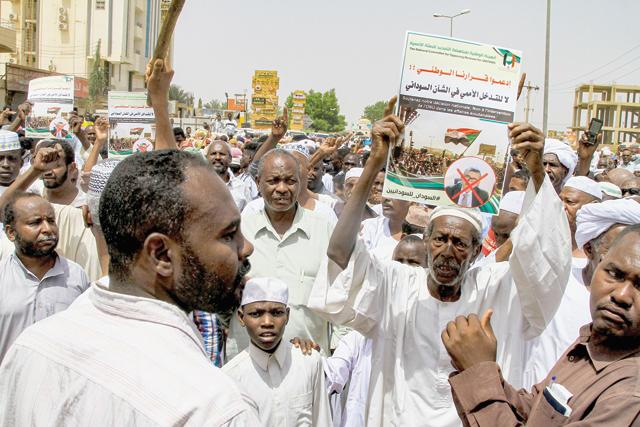You are here
Sudan civilians reject army offer as ‘ruse’, urge more protests
By AFP - Jul 05,2022 - Last updated at Jul 05,2022
KHARTOUM — Sudan’s main civilian bloc on Tuesday rejected a proposal by the country’s coup leader to make way for a civilian government as a “giant ruse” and urged more protests.
Army chief Abdel Fattah Al Burhan, whose power grab last October derailed a transition to civilian rule, had vowed in a surprise move Monday to “make room” for civilian groups to form a new transitional government.
But the main civilian umbrella, the Forces for Freedom and Change, called for “continued public pressure” on the streets after days of protests. It dismissed Burhan’s move as a “tactical retreat and a transparent manoeuvre”.
“The coup leader’s speech is a giant ruse, even worse than the October 25 coup,” said FFC leader Taha Othman. “The crisis will end with the coup leaders resigning and the forces of the revolution forming a civil government.”
The transitional government uprooted by Burhan last year had been painstakingly forged between the military and civilian factions in 2019, following mass protests that prompted the army to oust longtime dictator Omar Al Bashir in April that year.
On the streets of Khartoum, protesters defied security forces and held firm on their makeshift barricades, despite heavy fatalities late last week.
“We don’t have confidence in Burhan,” said Muhammad Othman, perched on a pile of bricks. “We just want him to leave once and for all.”
Security forces — as they have done repeatedly during the long-running protests — sought to break up the crowds by firing barrages of stun grenades and tear gas, according to pro-democracy medics.
‘Core grievances remain’
The FFC has so far refused to take part in talks with military leaders, despite pressure from international brokers that range from the United Nations, to the African Union and regional bloc IGAD.
Burhan said late Monday the military would no longer participate in the talks, wanting instead “to make room for political and revolutionary forces and other national factions” to form a civilian government.
Sudan, one of the world’s poorest countries, has seen only rare interludes of civilian rule. The latest coup not only worsened a political crisis but has also pushed the country deeper into a dire economic slump.
Burhan’s televised address came as hundreds of anti-coup demonstrators continued protests.
Pro-democracy medics said nine demonstrators lost their lives on Thursday, the deadliest violence so far this year, bringing to 114 the number killed in the crackdown against anti-coup protesters.
Protester Oumeima Hussein, speaking Monday, said the army chief must be “judged for all those killed since the coup” and vowed to “topple him like we did to Bashir”.
Hours after his surprise announcement, Burhan on Tuesday flew to Kenya for an IGAD emergency summit of East African leaders.
Kholood Khair, of the Khartoum think-tank Insight Strategy Partners, said she believed Burhan’s announcement was made to put “the pressure on the civilians”, but warned that it might change little on the ground.
“There’s no talk of accountability,” Khair said, noting that “core grievances remain”.
Khair warned that protesters feared that, after Burhan had put Bashir-era “Islamists back in government”, the coup leader was setting the military and allied armed groups up to “retain economic privileges”.
New ‘supreme council’
Sudan’s military dominates lucrative companies in sectors from agriculture to infrastructure.
Burhan’s pledge Monday to step aside for a new civilian “government” with “executive” powers was accompanied by another pledge — the establishment of a new “Supreme Council of Armed Forces”.
This body would be in charge of defence and security, he said, feeding into concerns among opponents that it would not be answerable to any government.
Burhan said the Supreme Council would combine the regular army and the paramilitary Rapid Support Forces, a much feared and powerful unit commanded by Burhan’s deputy, Mohamed Hamdan Daglo.
He also said that the ruling Sovereign Council — established as a key institution of the post-Bashir transition — would be disbanded.
While rejected out of hand by the main civilian bloc, Burhan’s announcements were welcomed by an ex-rebel senior commander who signed up to a 2020 agreement seeking to end Sudan’s conflicts and integrate insurgents into the army.
“Burhan’s speech had some positive points,” said Mubarak Ardol on Tuesday, without elaborating, other than to affirm his own “unconditional” commitment to internationally brokered talks.
Related Articles
KHARTOUM — Sudan's coup leader Abdel Fattah Al Burhan on Wednesday dismissed the last civilian members of his ruling body as part of a power
KHARTOUM — Hundreds of Sudanese protesters on Wednesday demanded the dismissal of the United Nations mission chief, who is working to resolv
KHARTOUM — Sudan on Wednesday began UN-facilitated direct talks between rival factions hoped to resolve a political crisis sparked by last y












